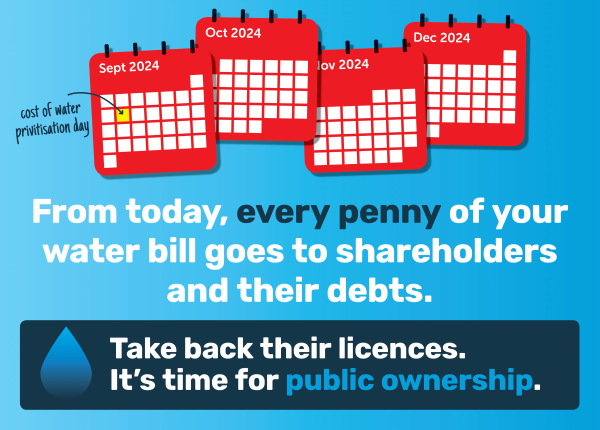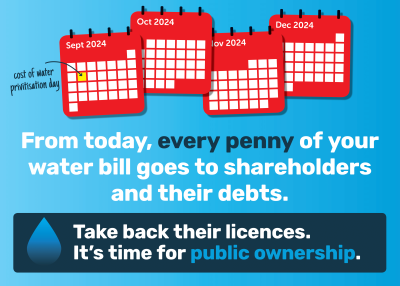
13 Sep 2024
From today, all the charges the privatised water industry makes to bill payers will go towards past and future shareholder dividends, clean water campaigners have claimed.
Analysis of the last available financial year suggests that 11% of water company revenue, and therefore customer bills, left the regulated utilities as dividends.
Figures reported in the Guardian further suggest that an average of 20 pence in the pound is spent on water company debts, rising to 28 pence for Thames Water.
According to research by the University of Greenwich, bill payers have broadly provided enough to deliver all the infrastructure investment to date, with the industry’s £60 billion debts taken on to help pay for its £78 billion in dividends.
In fact, researchers at Windrush Against Sewage Pollution have claimed that since privatisation there has never been a year that Thames Water shareholders put more into the business than they took out.
Campaigners claim the combined figure of 31 pence in the pound goes towards paying for debts and dividends, equivalent to the charges made after the 10th of September.
The milestone, dubbed the “cost of water privatisation day” by industry critics, comes just weeks after water companies claimed they needed higher bill rises to stay afloat.
While publicly owned water companies do borrow to invest, activists believe their cheaper interest rates allow lower costs to the public and higher levels of spending.
Matthew Topham, Lead Campaigner at the public service users group We Own It, said: “The industry is in ecological and financial crisis. Shareholders have treated the sector like an ATM, extracting billions, not a public service stewarding our natural environment.
“Under privatisation, it pays to pollute. Underinvestment in sewage treatment has led to spills, while funds are directed to shareholders’ pockets instead.
“When almost a third of our bills go to a shareholder surcharge, not improving our rivers and seas, it’s no wonder the public are resisting Ofwat’s plans to put up our bills.
“Any bill hikes will serve as a bailout by the public of failed private finance. Keir Starmer has the power to end this rip-off, taking the firm into public ownership for free, as recommended by the Treasury, and halving its debts using Special Administration.”
Matt Staniek, Campaigner with Save Windermere, said: “It’s very clear that the water industry is exploiting the captured bill payers of this country and regulators are allowing it. Instead of allowing water companies to unfairly increase bills, OFWAT should halt these obscene dividend payments to shareholders.
“Labour’s actions so far have been inadequate, despite campaigning heavily on this issue before the election. This is a scam and now Labour are the ones permitting it.”
Later today campaigners from across the country will meet with MPs inside Westminster as part of a “cost of water” drop-in to discuss the future of the industry.
Activists will be joining the March for Clean Water, spearheaded by Feargal Sharkey, on October 26th to demand an end to the sewage crisis [7].


Comments
Marco 1 year ago
Public services have become such a mess.
I believe that there should be a law of 'Personal Accountability' where actions taken, by Ministers, Civil Servants and all public serving entities or service/material suppliers, have to be personally signed by the individuals who made the decisions.
Then, if it goes wrong and is shown to be a bad decision (that they reasonably should have been aware of at the time, or approved without reassonable certainty), then the individual people who signed it should still be held personally accountable regardless of the passage of time.
It appears to me that the outpouring of sewage and inadequate level of effort and investment must (or should) have been known by a number of responsible individuals within the water companies, at Ofwat, the Environment Agency and perhaps others. Specific decision makers need to be held to account and made answerable for their poor decisions.
The NHS has a duty of candour, so why doesn't the water industry and those managing it have a duty of accountability - at whatever level. Even if you are the local sewage plant tecnician and you know that your company is illegally releasing sewage, then you should have a legal responsibility to be a whistle-blower. Is there an anonymous whistle-blower contact line for scenarios like this ?
Reply